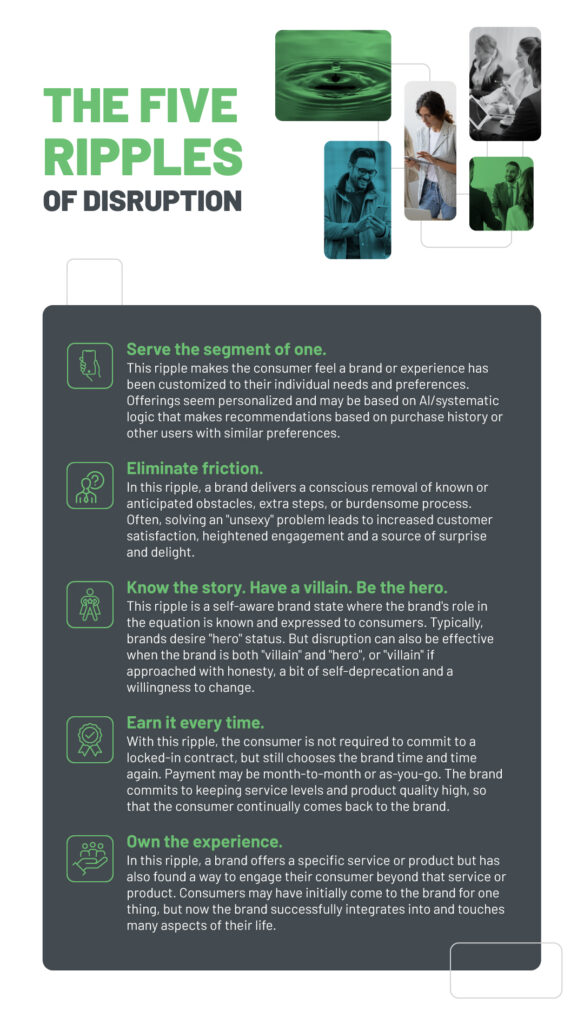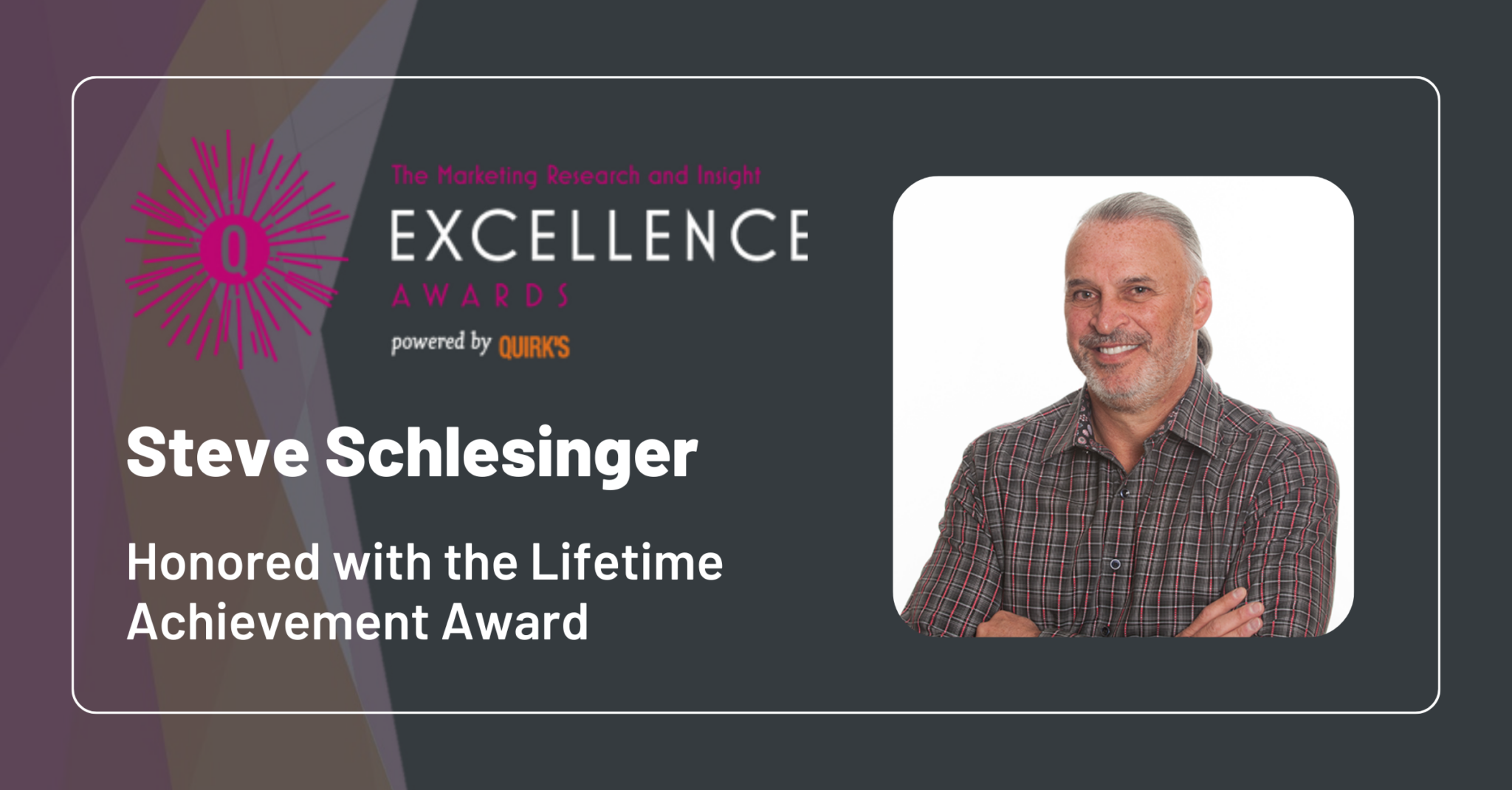At Sago Strategy + Insight, many of our clients are either disruptors – leading change and pushing boundaries – or they’re being disrupted – working to uphold the traditional foundations of their business while fending off new-to-the-scene competition. When we realized this trend is industry and brand-agnostic, we knew we needed to understand it better, particularly in the age of COVID-19 and the changes it has accelerated or created with consumer behaviors.
So we created a plan to decode what disruption means to consumers and to understand its impact on researchers by doing what we do best – listening, asking, and observing. After months of research and working closely with clients, we had a breakthrough.
We found five things – alone and in combination – that are either done well or missed when disruption is in play. No matter the client. No matter the business. These are the insights that helped us develop what we call the 5 Ripples of Disruption.
Obviously, we think this take on disruption is incredibly powerful and interesting, but we also know none of this matters if it can’t be activated inside all different types of organizations. Inside YOUR organization. So here are four easy steps you can take to make the ripples work for you.

Make it Portable
There is a reason we worked so hard to fit the 5 Ripples of Disruption into a succinct, digestible format. It wasn’t to downplay the hour and hours of hard work our team put in behind the scenes – it’s because we know a good, straightforward visual and story usually lives longer than any slide deck.
A good story like this one is persuasive and interesting and can work hard not only to convince your colleagues and teams that disruption is interesting but also that the concepts are worthy of adoption and add value. Once you start to look for and see the ripples (or missing ripples) inside your business and inside other businesses – you start to see them everywhere. And so we’ve found portability is key. We want and need this handy when we’re having discussions about any business (ours included).
Start with Presearch
The next step in practical activation of the 5 Ripples of Disruption is to use them for presearch. Do you have a puzzle? A hunch? A question that could really use some research but needs to be better defined? The 5 Ripples of Disruption are a valuable litmus test for establishing success criteria for any type of research investment.
For example, eliminating single-use plastic may be an emerging trend you’re watching and thinking about prioritizing for your brand. The 5 Ripples can help frame a simple conversation like this. An authentic message of sustainability has the potential to win hero status with younger Millennials and Gen Z-ers especially, but do you know the whole story? If your packaging is sustainable but your product still contributes to significant carbon emissions or pollution or deforestation, will sustainable packaging be a step in the right direction or an inauthentic band-aid over a larger issue? Do you risk upending production and materials sourcing and your whole supply chain only to veer inadvertently into villain status? What impact will this have on new product development, distribution, and advertising?
Used in this way, the construct of disruption can serve as a guide to help you have the right conversations faster and with a more organized approach.
Find the Common Threads
During research or even as you look at the library of research you own – are there any common threads? For example, are aging Boomers more likely to give you permission to “Own the Experience” based on similar findings from separate studies?
Here disruption activated is an evaluative tool for illuminating common ground – a way to take a more macro or meta approach to understand individual findings and insights. The themes hold up in almost any circumstance and offer an incremental way to turn up the volume on what you already know and what you’re learning. What larger story can you tell or should you be telling (and empowering others to retell?) inside the research you’re doing every day? What insight, amplified by an easy-to-grasp disruptive concept, might have legs to serve you, your brand, and your product well beyond the final report readout and into measurable, tangible returns?
Navigate as a Team
And finally, one of our favorite ways to activate the 5 Ripples of Disruption is to hold a workshop after the research is complete and before the report is delivered. In these sessions, the team is immersed in the 5 Ripples and actively participates in an engaging, facilitated journey to apply these principles to your brand. The results are a mapped pathway to disruptive action.
In this kind of session, we evaluate which ripples offer the greatest opportunity or impact for the brand, and how might we put the select ripples into action. It’s a productive way to quickly take research findings from insight to action.
More specifically, we use these sessions to examine:
- Bang-for-buck evaluation of ideas or concepts from your research (costs, stakeholders, outcomes, timelines)
- Fit of selected ripple actions with criteria for success
- Prioritization of best opportunities
- Team roles and responsibilities to deploy the select ripple action(s)
- Parking lot/next steps for additional emergent opportunities and white spaces
It’s not an exaggeration to say we use the 5 Ripples of Disruption every day. While our industry is heavy on technology tools, often we’re light on strategic infrastructure frameworks and tools like this one. We want to encourage more discussions about how to change that. And in the meantime, we hope you’ve gained some clarity on how to take productive action with this disruption and the ripples inside your business. Even better, if you want to share how you plan to use it, we’re all ears!
Want to dive into the 5 Ripples of Disruption? Email [email protected] to get started.










 5 Minutes
5 Minutes 












